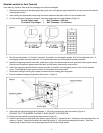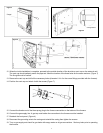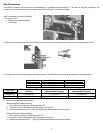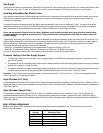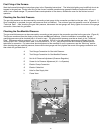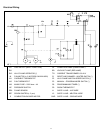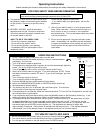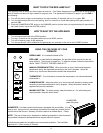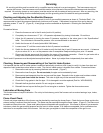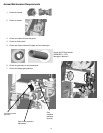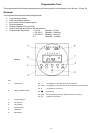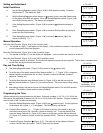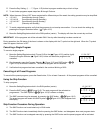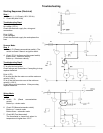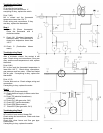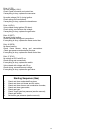Servicing
All servicing activities must be carried out by a qualified service technicial or a service agency. The home owner may not
service the furnace. The home owner must read this section to be informed of the periodic maintenance and checks the
required. All servicing (except on vent system) must be carried out with the external casing removed. After any servicing, the
external casing must be reinstalled properly and the grounding wire of the external casing reconnected.
Checking and Adjusting the Gas Manifold Pressure
The furnace comes set from the factory at the correct HI and LO gas manifold pressures as shown in “Technical Data”. It is
recommended to check the pressures periodically (minimum once a year). If adjustment is required, this can be done by
adjusting screws “C” and “D”. (Figure 8) A test gauge must be connected as explained in “Checking the Gas Manifold
Pressure”.
Proceed as follows:
1. Place the furnace on and in the HI mode (knob in HI position).
2. Completely turn down screw “C” (HI – LO operator adjustment) by turning it clockwise. Do not force.
3. Adjust the HI pressure by turning the screw D (pressure regulator) to the value given in the “Specifications”
table. Turn clockwise to increase the pressure, turn counterclockwise to decrease it.
4. Switch the furnace to LO mode (button MAX–MIN down).
5. Loosen screw “C” until the correct value for the LO pressure is achieved.
6. Switch the furnace between LO to HI mode to verify that both the HI and LO pressures are correct. A tolerance
of plus or minus 0.1 in. w.c. on the pressure value is acceptable. Readjust starting from point 1 if needed.
7. Disconnect the test gauge and firmly tighten the screw of the gauge connection. Check for gas leaks with a
soapy water solution and correct any leaks prior to operating the furnace.
The HI and LO pressures must be adjusted as explained above. Never try to adjust them independently from each other.
Checking, Removing and Reassembling of the Vent Air Intake System
It is essential that the vent air intake system is examined periodically (minimum once a year) to verify it is clean from dust and
deposits of solid materials such as leaves or nests. The vent air intake system is checked from outside. Proceed as follows:
1. Remove the vent cap by removing the three outer screws. (Figure 7)
2. Remove the inner flue pipe. Do not use tools; the pipe can be extracted by hand.
3. Remove dust and desposits from the vent cap and flue pipes. Deposits in the air pipe must be taken outside.
Do not push them inside the furnace. The outer air pipe may not be removed from outside.
4. Check the O-ring gasket in the flue pipe. If it is damaged in must be replaced (Part No. WFN-RNG003).
5. Reinstall the flue pipe from outside. Do not use glue or sealants.
6. Reinstall the vent cap on the flue pipe. Do not use glue or sealants. Tighten the three outer screws.
Lubrication of Moving Parts
This furnace does not require lubrication. Do not try to lubricate any part of the furnace such as motors bearings, keys, knobs,
screws, etc.
Flame Visual Check
Correct and proper operation of the burner may be checked by examinng the burner flame. Check the burner flame anytime the
external casing is removed from the furnace. The flame may be examined through the flame viewer. (Figure 8) The flame must
be stable and have blue color. Some small yellow tips are acceptable with propane gas. If the flame is yellow or has excessive
turbulence, check the gas manifold pressure and the vent air intake system. If all these are acceptable, call a qualified service
technician for a complete check of the furnace. Call also your gas supplier to check the composition of the gas in use.
14



